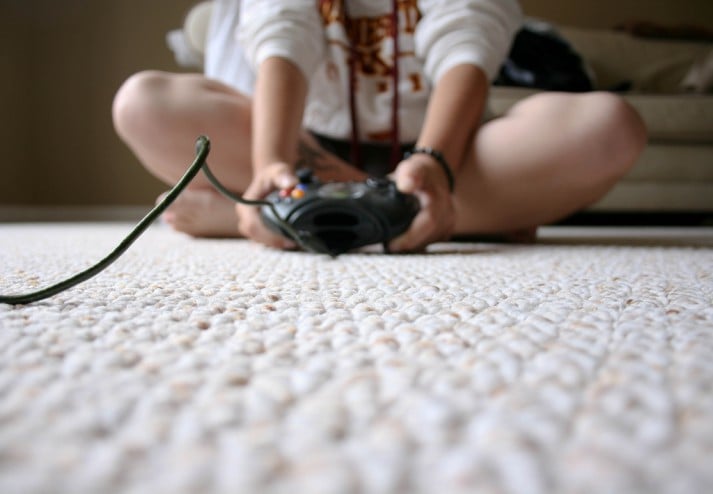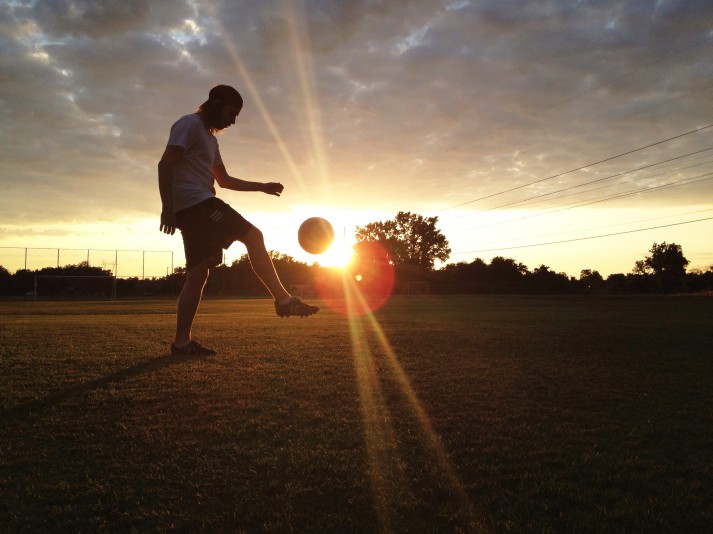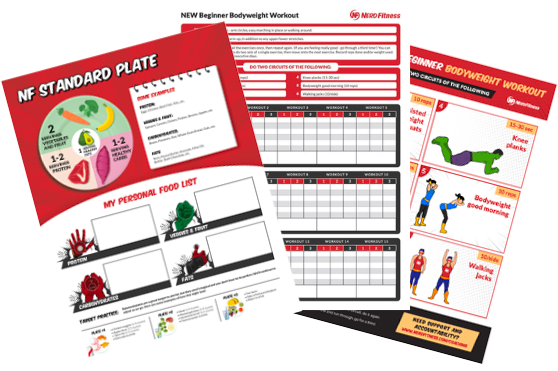
I slid into home on a close play.
It was a few weeks back during a recreational kickball game, and because I essentially slid with 100% effort (while wearing shorts and sneakers) trying to avoid getting pegged with the ball, I scraped up my legs, arm, stomach, and hand.
All of my teammates starting laughing at me, saying “Steve, it’s just a kickball game! Why did you slide!?”
As I looked at my bruised and battered body, I couldn’t help but laugh. It just…happened, just like it has happened a few other times this season during minor plays. No matter how hard I try to just have fun and not care about kickball, 10 years of Little League must have worn special pathways into my brain to force me to think “CLOSE PLAY! SLIDE! SACRIFICE YOURSELF!”
It’s something I have done SO many times in my life that it has honestly become part of my DNA.
I think of other instances too in which my brain reverted back to its automatic decision making processes:
- Riding a bike! It’s something I could do now even if I took 10 years off.
- I remember spending hours learning Orchid’s 80-hit combo in Killer Instinct so that I could pull it off automatically in the arcade and destroy the competition.
- When I shoot a foul shot in basketball, it’s always one spin, two bounces, then spin it in my hands, then shoot (usually a miss, as I’m not very good. ha!)
- I can play certain songs on the piano with my eyes closed, but if I miss a note or have to start halfway through the song, it’s almost impossible for me to play it right.
As I was sitting there on the bench, looking at my bloody limbs, laughing at myself for not being able to turn off the switch, I thought about this concept of “muscle memory” and “automatic response,” and if we could apply them to making us healthier.
The answer, of course, is: “Yeah. DUH.”
What is muscle memory?

Muscle memory is the act of completing a particular physical or mental task with such repetition that your body then learns to complete the task more efficiently, using less brain power.
Your muscles don’t actually have brains, but rather your brains have learned to quickly call upon these quick procedure lists to get certain tasks done as quickly and efficiently as possible. The more often you complete these tasks, the less “processing power” your brain needs to complete the task, the more automatic it becomes. Think of it sort of like a cache.
Think about the first time you played any video game. You were epically clumsy at first, having to learn how the controls work. You had to learn how to :
- Look left and right
- Pick up your gun/sword
- Jump and roll
- Move, strafe, and dodge enemies
- Attack, defend, cast spells
Then, after just a few hours of gameplay, your muscle memory starts to develop. After a few days or weeks, these things seem effortless:
- Defeat a boss by thoughtlessly connecting a combo of rolling, attacking, defending, and spell casting.
- Make it through the dungeon by taking on hordes of enemies, using items and strafing effortlessly.
Muscle memory isn’t just for video games. It helps us with all sorts of stuff: driving, catching baseballs, cutting vegetables, playing musical instruments…things that require plenty of thought, movement, and focus.
When it comes to getting healthy in real life, this concept of an “automatic response” is absolutely key for a healthy life.
Unfortunately, it can adverse effects as well:
- If you spend months and months learning to squat improperly, it’s VERY difficult to get yourself to break those bad ‘habits’ and reteach yourself to squat the right way.
- If you learn to play a song incorrectly (or any other activity), you are teaching your body “this is the right way to do this,” even if it’s the wrong way!
- When you get busy at work, if your brain immediately and instinctively deals with stress by requiring candy and a soda, your brain has been trained to say: “this is my most efficient path to happy.”
Although we’re really talking about habit-building here when it comes to our life, thinking of it in terms of muscle memory can help us understand how why we’ve failed in the past and how to break through those barriers.
Muscle Memory in Life

A few weeks back, a friend had his life turned upside-down.
“Steve, I’m trying to be healthy, but I hadn’t built up enough of a “muscle memory” for healthy living during the slow months. Now that things are crazy, I’m reverting back to my normal unhealthy behavior.”
For him, his “default” was two foot long subs from subway and ice cream. This was how his body learned to cope with stress.
For NF Team Member Staci, her OLD way of dealing with stress was an entire box of Kraft Mac N’ Cheese. Now, because she’s spent years developing her “muscle memory,” she deals with stress and chaos with going to the gym.
We are creatures of habit. The things that we do on a daily basis, the way we walk, the way we talk, the way we sleep (or not sleep), the things that make us happy or sad, are all results of hundreds and hundreds of repetitions of these activities.
When we try to build NEW habits, forge new pathways in our brain, it’s a lot of freaking work.
For example, instead of hitting up the Drive-Thru at McDonalds, we have to remember to:
- Go to the grocery store
- Pick out the right vegetables and chicken
- Drive home, prepare the vegetables
- Cook the chicken
- Set the table
- Eat
If you don’t have those habits ingrained, just reading that list must have felt exhausting.
Here’s another example: instead sitting at home watching TV, we decide we want to learn to squat:
- Step under the bar properly
- Pinch shoulder blades back and rest the bar properly across back
- Remember to squat deep
- Knees lined up with toes
- Explode back up with proper form
Phew! In both instances, there are a LOT of changes and a lot of things happening – I got tired just typing those lists out.
The automatic stuff (McDonald’s, watching tv) comes easy. We’ve always done them and they require little effort. They may even feel like second nature. The second part is new and requires a tremendous amount of work. And let’s face it: there can be some roadblocks the first few times around.
I remember sucking the first time I tried to cook a grown up meal, and I remember being absolutely terrible at squats.
Now? It’s second nature. Going to the gym and doing a deep squat is part of my DNA, just like sliding into home. If I need to whip up a healthy meal, I can do so in a matter of minutes and it’s delicious! It just took practice, lots and lots of practice.
But now it’s like brushing my teeth.
The good news is, now that I’ve set these “healthy options” to be my automatic default…when things get hectic or crazy or life changes, I automatically fall back on these habits, which keep me afloat.
I remember when traveling around the world, exercise became my “Constant” (thanks for the analogy, Lost!).
So, how do we build our life muscle memory and give us HEALTHY habits to fall back on?
How do we make healthy our constant when everything else falls apart?
How to Build muscle Memory in Life

In Malcolm Gladwell’s Outliers, he discusses the concept of mastery: in his research, he found that most experts had spent at least 10,000 hours to master their craft.
The important part of that equation: it’s not JUST 10,000 hours of practice, but 10,000 hours of GOOD practice:
- Playing the same crappy song with poor form on violin over and over for 10,000 hours means you’re going to be REALLLLLY good at playing the violin poorly.
- Compare that to actively working on your technique, having a coach or teacher critique you, and focusing on improving all aspects of playing.
In order for us to build this “muscle memory” in our life, we don’t need to spend anywhere near 10,000 hours of practice living healthy, but we do need to practice. Without actually regularly doing the activity (practicing), you will never feel like your new healthy activity is second nature.
In order to do that, you need to:
- Pick ONE or TWO new automatic-habits you’d like to create, no more!
- Make it easy to complete the new activity. Minimize the steps between you and this new life habit you’re looking to build. Find ways for you to complete the new activity using mimnimal willpower.
Let’s give you some examples for those four things:
1) Pick one or two new memories: Instead of completely switching your workout from machines and treadmills to barbell movements (which can be very overwhelming), just swap out ONE movement. Instead of the leg press, learn to squat. And then in three weeks, once you feel good about squatting, you can add in the overhead press.
I recently took up the violin and wanted to start playing more (so I can suck less), so I bought a cheap $10 violin stand to set it up next to my desk, improving my batcave. Instead of having to take it out of the case, tune it, set it up, and then play…I can pick it up quickly and play for five minutes at a time when I need a break from writing…like right now!
Okay I’m back 🙂
We have finite amounts of willpower, and if we try to start too many things at once, we can overload our circuits and fail. Better to get one new thing down (like brushing your teeth), and then move on to the next thing.
2) Minimize steps for the new activity: If you are trying to become a healthy cook, there are a lot of steps involved. As Tim Ferriss points out in the Four Hour Chef, minimize the steps between you and your new cooking habit: buy pre-cut vegetables, use paper plates and plastic knives and forks (no dishes!), and so on. When I was learning to cook/like vegetables, I picked ONE veggie (asparagus) and focused on cooking that right. Only then did I move on to my next vegetable.
Want to become a runner each morning? Sleep in your running clothes, put your alarm across the room, and put your running shoes next to the alarm. You’re already halfway there, might
3) Remove the need to REMEMBER what you need to do: I renamed the alarm on my phone “MEDITATE SUCKA,” so when it wakes me up in the morning, my phone reminds me to meditate for 2 minutes (thank you Calm.com)
Surround your apartment with mental cues. I wanted to make working on handstands an automatic habits for me, a part of my DNA. So, now after I wake up, I have to walk past a section of my wall with a simple post-it note on it that says “HANDSTANDS.” It’s a simple mental cue that tells me what to do without having to remember myself.
4) Remove the need for willpower: I mentioned willpower before. We all know we need to eat better and exercise more, but we oftentimes don’t do it. So when we’re looking to rewire our DNA and second nature, we need to be strategic.
If you are always tired after work and skipping your workouts, why not exercise in the morning, before the work day mentally wears you down?
If you struggle with unhealthy eating during times of stress, perform “the purge,” and remove all junk food from your house. It’s a lot tougher to eat poorly when you need to drive 10 minutes to go get it.
If you struggle with stopping at fast food on the way home (from another fast food restaurant), alter your work path. Like a pavlovian response, certain cues and sensory changes can be a HUGE help. So change it up! Drive home a different way, or walk home down a different street. Break the cycle.
The point with all of the above is like practice – you are training your body/brain as a whole to build automatic healthy habits: the automatic “default” that you’ll fall back on when the sh** hits the fan and life gets busy.
IMPORTANT: Momentum is a powerful thing. If you can’t follow through on all of your healthy habits when life gets crazy, pick one or two that you CAN and stick with those. Tread water, and “just keep swimming” for as long as you need to, so that you don’t need to start back at square one when you get going again.
Let’s Play Memory!

We humans are incredible pieces of technology.
Not only are we capable of great things, but we’re capable of rewiring our own brains and muscles. It just takes practice. A lot of practice. A lot of high-quality practice. And the best way to do that is to focus on high quality practice for ONE new activity you want to build into your system.
There will come a time in your life when things will get hectic (you might already be there). By focusing on those healthy life muscle memory patterns TODAY, you are setting yourself up to succeed when life throws you a curveball.
I have a hunch that no matter how often I tell myself to not slide in kickball, if it’s a close play I will automatically sacrifice myself to get the run. I can’t help it – like a cheetah chasing a gazelle, it’s just hardwired to my DNA now.
I want to hear from you:
What’s one new activity you want to establish, and what tactics are you going to use to ensure you succeed?
Change your DNA, change your habits, change your fate.
-Steve
PS: One last reminder that Early Bird pricing for Camp Nerd Fitness (“We hold you in our hearts…”) ends tomorrow, Friday, at Midnight! Join us at the biggest event in NF history – see you there 🙂
###
photo source: Chapendra: xbox, Kelis: original-memory, Vivid Lime: Drive-Thru, Brian Littmann: Soccer, Rich Brooks: Memory Cards


